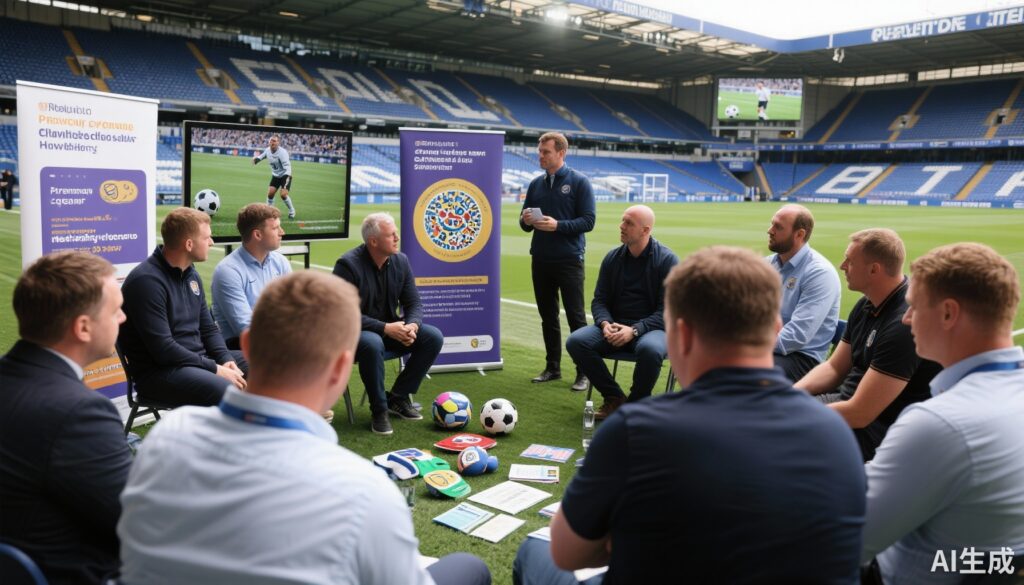Patient Information
The study targeted male football fans, a demographic with elevated risk factors for gambling harms due to their predominance in sports betting populations and younger age profiles. Participants were adult males who were fans of professional football clubs across England. The presenting issue was gambling involvement that ranged from casual betting behaviors to more severe gambling symptomology. The intervention and study did not enroll individuals with acute or severe gambling addiction requiring specialist safeguarding.
Diagnosis
The ‘diagnosis’ in this context is the identification of gambling behaviors associated with increased risk of harms, including social, economic, and health threats such as suicidal ideation and attempts. Participants were characterized by their gambling engagement level. The focus was on those at risk of the progression of gambling harms rather than those already severely affected. The categorization used symptomology screening aligned with gambling harm research, distinguishing casual bettors from those with problematic patterns requiring specialist care.
Differential Diagnosis
Though not strictly clinical, the differential considerations included assessing whether participants had gambling problems severe enough to require specialist interventions beyond the scope of the Football Fans and Betting programme. This differentiation was essential to ensuring participant safety and appropriateness of the intervention. Additionally, background factors such as comorbid mental health issues or broader addictive behaviors could influence eligibility and intervention outcomes but were outside this feasibility study’s direct scope.
Treatment and Management
The intervention, titled “Football Fans and Betting,” was a structured, group-based program delivered face-to-face at professional football club stadia. Conducted over eight weekly sessions of 90 minutes each, components included interactive classroom-based education focusing on:
– Understanding gambling behaviors
– Insight into gambling industry tactics
– Awareness of gambling impacts and associated harms
– Promoting social connectivity through physical activity group work
Sessions were facilitated by trained community coaches associated with the football clubs. Recruitment strategies involved branding and outreach attempts tailored to appeal to football fans.
Outcome and Prognosis
Recruitment and retention faced significant barriers despite iterative adaptations. Many in the target population did not recognize a need for gambling support, perceiving gambling as a normative part of their social environment. Conversely, individuals with higher severity gambling disorders, who might have been more motivated, were ineligible due to the program’s focus on prevention rather than treatment of established addiction. Consequently, insufficient participant numbers were recruited to progress to a pilot randomised controlled trial.
However, participants who completed the program reported increased understanding of gambling risks and industry practices, and perceived benefits in supporting behavior change. The intervention was more successfully delivered within grassroots and local community contexts outside the professional club setting.
Discussion
This feasibility study highlighted the complex challenges of implementing gambling harms prevention interventions among male football fans within professional football clubs. Key findings include:
– Recruitment difficulties stemming from low perceived need amongst the broader target group and ineligibility of those most in need.
– Sociocultural normalization of gambling in football fan communities creates a barrier to engagement with preventative interventions.
– Conflicts of interest were noted given many professional football clubs’ commercial partnerships with gambling companies, resulting in participant skepticism regarding club motives.
– Delivery within professional football settings was limited by these dynamics, whereas community and grassroots settings demonstrated greater feasibility.
These challenges underscore the difficulties in disentangling gambling promotion embedded in the commercial aspects of professional sports from public health efforts to reduce gambling harms. Early interventions to prevent harm escalation are critical but require supportive social and organizational environments to be effective.
Future directions warrant embedding interventions like Football Fans and Betting in football communities free from commercial gambling conflicts and with a clear emphasis on early preventive outreach. Tailoring recruitment and messaging to counter social normalization of gambling and enhancing trust are essential.
Funding and Acknowledgements
This study was funded by the National Institute for Health and Care Research (NIHR) Public Health Research programme (award number NIHR127665). The authors acknowledge the contributions of community coaches, football clubs, and study participants.
References
Reith G, Biggar B, Bunn C, Deidda M, Donnachie C, Graham F, Gray C, Greenlaw N, Hunt K, Philpott M, Platt N, D Rogers R, Rooksby J, Wyke S, Wardle H. Group-based interventions to reduce gambling involvement among male football fans: a synopsis of findings from a feasibility study. Public Health Res (Southampt). 2025 Jul;13(6):1-24. doi: 10.3310/SWWP9393. PMID: 40690427.



